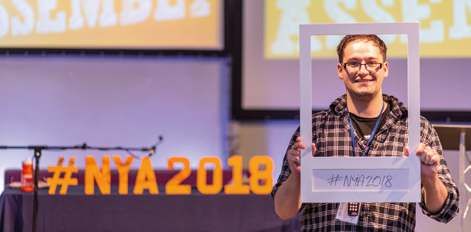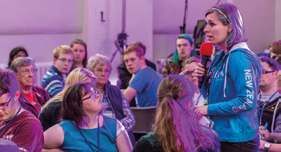From end of life to ecumenical human libraries…
Seonaid Knox reports from the 2018 National Youth Assembly at Gartmore House.
NYA
ON Friday August 17, 80 delegates aged from 17 to 25 arrived at Gartmore House in Stirlingshire for the National Youth Assembly of 2018.
The residential event, which ended on Monday August 20, looked at three topics: End of Life issues, Being Ecumenical, and Social Media. These topics were discussed over the course of the weekend with speakers giving presentations before the delegates looked at the subjects in their small groups and then as a full Assembly. Alongside the discussions, the delegates participated in workshops, worship, ‘big chats’, consumed lots of cake and hot chocolate, and jigged at the all-important ceilidh.
Each year the delegates are split into groups, led by a small group leader, to allow for in-depth discussion before debates. To help the groups bond, a small group challenge was organised for the Friday evening which was fun and served to get the delegates working together.
Worship is an integral part of NYA and before the small group challenge, delegates whose favourite hymns had been chosen to sing shared the reasoning behind it with the Assembly which was really special. It was great to welcome the Moderator of the General Assembly to Gartmore on Friday to share her favourite hymn with us too – even if she did cheat in the Moderator’s challenge!
On Saturday morning the hard work began as we looked at our first discussion topic, End of Life issues, which was split into three subtopics – funeral poverty, child bereavement, and life-limiting illnesses. The input sessions were delivered by the Rev Bryan Kerr (a minister in Lanark), The Rev Gayle Taylor (a bereavement support practitioner for Child Bereavement UK and a Church of Scotland minister), and Maureen O’Neill from Faith in Older People Scotland.

Regarding funeral poverty, the Assembly felt that the Church should shout about their ministers conducting funerals for free as it’s not widely enough known. For child bereavement the Assembly acknowledged how this differs from other forms of bereavement because, regardless of a child’s age, parents do not expect to outlive their kids. Therefore, local bereavement groups proved a popular pastoral response to bereavement – one that all churches could realistically offer. Maureen’s presentation on life-limiting illnesses led the Assembly to discuss how everyone is on a faith journey regardless of age or health, therefore we must better cater for all stages of the journey and – most importantly – recognise that the Message never changes but how we nurture people’s faith at various stages in their life can look very different. Delegates also felt that we should reevaluate how we think about dying because if it remains a taboo topic, people will continue to not write wills or make their wishes clear which can compound the grief for families.
Afterwards we had an Ecumenical Human Library which involved delegates moving round and meeting members from other denominations to learn more about our Christian siblings. This helped delegates better understand and engage with how other denominations worship and operate, which proved valuable the following day when the Assembly discussed Being Ecumenical. Delegates also attended a creative workshop on Saturday, choosing either: Conversations in Prayer; Preparing and Leading Worship; The Bible: Don’t Go It Alone, or How Can We Do Politics Differently?, all of which enabled delegates to explore something about their faith they may be interested in or struggling to connect with.

National Youth Assembly 2018
Photos: Chris Hoskins
To finish off the evening, delegates enjoyed a ceilidh in the conference centre. The band were fantastic and it was fun to see the international delegates from Malawi and Lebanon take part too. This was a chance for delegates to ‘let their hair down’; there’s a lot to cram into the weekend, so it’s nice to spend some time socialising.
Before our discussion on Sunday, the delegates walked to Gartmore Parish Church for morning worship – a personal highlight of mine. It’s always a tight squeeze but it’s oddly comforting to see people practically spilling out of the pews, and while the congregation may be small in number they always extend a big warm welcome to the Assembly, and we were delighted some members joined us for lunch.
In the afternoon for our Being Ecumenical discussion, the Rev Liam Fraser (a pioneering minister from Edinburgh) spoke about the work of the Ecumenical Relations Committee of the Church of Scotland and this made the NYA think about ecumenism in Scotland and what it could look like post Brexit. The main point that arose from the small groups and full group discussion was that we are united by the same core beliefs and so shouldn’t focus on what divides us. The Assembly believed it would be beneficial for the Church, local churches and ourselves to remember that being united doesn’t mean being unitary, and so collaborative working doesn’t mean removing or undermining these differences. In fact, there was consensus that denominations can learn from one another because even within the Church of Scotland congregations don’t do things the same way. If we worked with our denominational siblings at a local level, Christians could effectively deliver what is best for their parishes rather than necessarily implementing other Church of Scotland congregations’ ways of doing things. Delegates believed this would send a strong message to people of other faiths and non-faith who think we ‘can’t get along’. Considering political and religious situations at home and abroad, this is a poignant message and Christians should aim to be an example for others.
On Sunday evening the delegates attended workshops on Community Development, Forces Chaplaincy, Faith in Schools, or International Experiences. This enabled the Assembly to learn about some of the topical subjects in society, as well as explore other types of ministry and hear about the international trips that are offered to young people in the Church.
For our Social Media discussion on the Monday, Jane Bristow and Jill Stevens from the Church of Scotland’s Communications Team joined us to look at how we live out our faith online and how local congregations and the national Church can use social media more effectively. Many delegates said they were already managing their church’s social media accounts and shared how they expressed their faith online, so the Assembly discussed the pros and cons of social media and how it gives Christians a platform to speak out about injustice in the world.
‘Big Chats’ began around midnight on Saturday and Sunday which explored Gender and Mental Health issues, respectively. These were optional, as were the Morning Prayers before breakfast, but provided additional space for delegates to converse, debate and worship together.
Overall NYA 2018 was one to remember, although for me that might be down to how exhausting it was as Clerk, but I can’t emphasise enough how integral the NYA has been to my faith journey for almost a decade. I’ve made friends for life, learned more about the Church, and have been able to freely explore my faith which is something I’ll always be grateful for.
Seonaid Knox was Clerk to the 2018 National Youth Assembly.